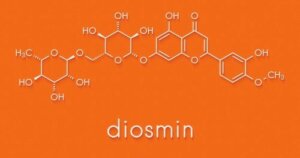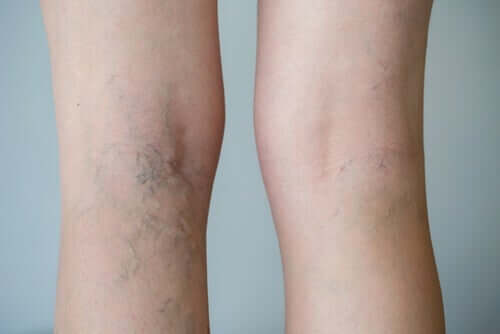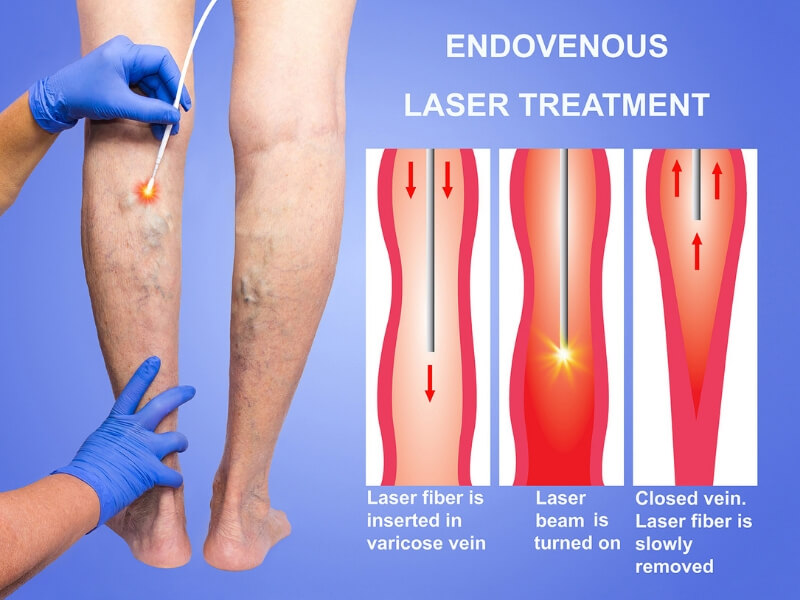Daflon Medication: Uses and Side Effects

Daflon is the trademark of a medication composed, among other substances, of two active ingredients: diosmin and hesperidin. Diosmin is the most relevant and important substance when it comes to generating health effects.
Daflon is a venotonic drug, that is, it increases the tone of the veins and the resistance of the capillaries. The capillaries are the small blood vessels in the body.
Due to its effects, doctors indicate it to treat problems such as varicose veins and hemorrhoids of venous origin. It also relieves symptoms related to mild venous insufficiency of the extremities.
Daflon medication characteristics

Chemically, it’s a drug of the flavonoid family because of its molecular structure. It comes from the secondary metabolism of different plants that synthesize it.
As we’ve just mentioned, it has venotonic or phlebotonic effects, which are characterized by stimulating the venous tone, although it also exerts its effect on small blood vessels. This way, it also improves blood circulation in general, as well as prevents its wear and tear, rigidity and fragility.
For Daflon to be effective, it’s essential to accompany its administration with a series of habits that improve the result. It’s important to adopt a healthy diet and take the time to exercise. Otherwise, just the drug alone won’t have any effect.
How does Daflon medication work in the body?
Daflon is the set of two active principles: diosmin and hesperidin, the first being mainly responsible for the effect.
Diosmin has the following effects on the body:
- Improves the venous return
- Protects the capillaries
- Reduces permeability
- Increases lymphatic drainage
As for the other active principle, hesperidin, in addition to enhancing the effects described, also contributes to neutralizing free radicals. This is why it’s said to have an antioxidant effect.
Discover: The Benefits of Carotenes
Uses of Daflon

Due to the effects that it produces in the organism, doctors recommend this medicine to improve the symptomatology of different affections of the blood vessels. Let’s see the main indications:
1. Chronic venous insufficiency
This disease is characterized by the difficulty of the blood from the lower extremities to return to the heart. It usually appears because the veins of the legs are weak, which often ends up causing the development of varicose veins.
2. Varicose veins
Whether they’re caused by chronic venous insufficiency or because of other causes, varicose veins are the product of dilating veins. They become visible when blood accumulates in them.
This happens because the valves in the veins responsible for pushing the blood back to the heart are weakened and cannot close properly.
Also read: 5 Healthy Habits To Relieve Varicose Veins
3. Edemas
This is another use of Daflon. Fluid retention is a very common condition in women. Due to the venotonic effects of this medicine, blood circulation becomes stronger and more toned.
As a result, the extravasation of liquids is difficult, especially those of cardiovascular origin.
4. Hemorrhoids
You could say that they’re like varicose veins that originate in the veins that irrigate the anus. They usually don’t cause symptoms, but when they do, they usually cause pain when sitting and itching. Daflon is also useful in these cases.
What are the side effects of Daflon?

This medicine, like any medicine on the market, could possibly have some side effects. Among the most frequent we can mention:
- Problems in the intestinal tract: nausea, stomach pains, colitis
- Skin rashes
- Quincke’s edema
- Headaches and dizziness
Conclusion
Two active ingredients and other excipients form this drug. Specialists and patients use it to treat different illnesses associated with the venous circulation system, such as hemorrhoids and edemas.
It’s a drug that doesn’t require a prescription – it’s over-the-counter. However, this doesn’t mean that we can self-medicate. You should always consult your pharmacist on the use of this medication and any questions you may have about it.
Taking medicine without proper consultation could cause serious consequences for your health as well as for the rest of the population, since there are certain drugs that lose their effectiveness when administered when they aren’t recommended.
All cited sources were thoroughly reviewed by our team to ensure their quality, reliability, currency, and validity. The bibliography of this article was considered reliable and of academic or scientific accuracy.
- Diosmin. (2004). Alternative Medicine Review.
- Tahir, M., Rehman, M. U., Lateef, A., Khan, R., Khan, A. Q., Qamar, W., … Sultana, S. (2013). Diosmin protects against ethanol-induced hepatic injury via alleviation of inflammation and regulation of TNF-α and NF-κB activation. Alcohol. https://doi.org/10.1016/j.alcohol.2012.12.010
- Jain, D., Bansal, M. K., Dalvi, R., Upganlawar, A., & Somani, R. (2014). Protective effect of diosmin against diabetic neuropathy in experimental rats. Journal of Integrative Medicine. https://doi.org/10.1016/S2095-4964(14)60001-7
This text is provided for informational purposes only and does not replace consultation with a professional. If in doubt, consult your specialist.








